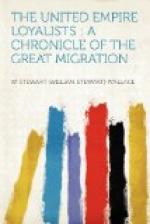Of course, the test laws were not rigidly or universally enforced. In Pennsylvania only a small proportion of the population took the oath. In New York, out of one thousand Tories arrested for failure to take the oath, six hundred were allowed to go on bail, and the rest were merely acquitted or imprisoned. On the whole the American revolutionists were not bloody-minded men; they inaugurated no September Massacres, no Reign of Terror, no dragonnades. There was a distinct aversion among them to applying the death penalty. ’We shall have many unhappy persons to take their trials for their life next Oyer court,’ wrote a North Carolina patriot. ’Law should be strictly adhered to, severity exercised, but the doors of mercy should never be shut.’
The test laws, nevertheless, and the other discriminating laws passed against the Loyalists provided the excuse for a great deal of barbarism and ruthlessness. In Pennsylvania bills of attainder were passed against no fewer than four hundred and ninety persons. The property of nearly all these persons was confiscated, and several of them were put to death. A detailed account has come down to us of the hanging of two Loyalists of Philadelphia named Roberts and Carlisle. These two men had shown great zeal for the king’s cause when the British Army was in Philadelphia. After Philadelphia was evacuated, they were seized by the Whigs, tried, and condemned to be hanged. Roberts’s wife and children went before Congress and on their knees begged for mercy; but in vain. One November morning of 1778 the two men were marched to the gallows, with halters round their necks. At the gallows, wrote a spectator, Roberts’s behaviour ’did honour to human nature.’
He nothing common did or mean
Upon that memorable scene
Addressing the spectators, he told them that his conscience acquitted him of guilt; that he suffered for doing his duty to his sovereign; and that his blood would one day be required at their hands. Then he turned to his children and charged them to remember the principles for which he died, and to adhere to them while they had breath.
But if these judicial murders were few and far between, in other respects the revolutionists showed the Tories little mercy. Both those who remained in the country and those who fled from it were subjected to an attack on their personal fortunes which gradually impoverished them. This was carried on at first by a nibbling system of fines and special taxation. Loyalists were fined for evading military service, for the hire of substitutes, for any manifestation of loyalty. They were subjected to double and treble taxes; and in New York and South Carolina they had to make good all robberies committed in their counties. Then the revolutionary leaders turned to the expedient of confiscation. From the very first some of the patriots, without doubt, had an eye on Loyalist property; and when the coffers of the Continental Congress




